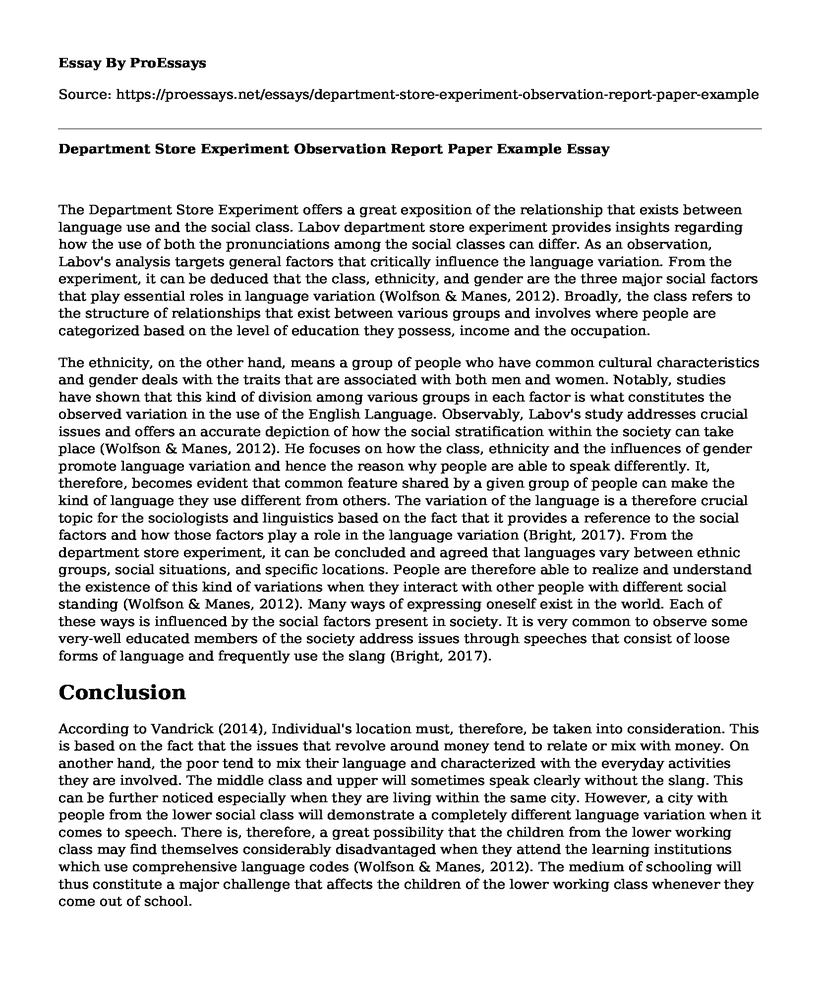The Department Store Experiment offers a great exposition of the relationship that exists between language use and the social class. Labov department store experiment provides insights regarding how the use of both the pronunciations among the social classes can differ. As an observation, Labov's analysis targets general factors that critically influence the language variation. From the experiment, it can be deduced that the class, ethnicity, and gender are the three major social factors that play essential roles in language variation (Wolfson & Manes, 2012). Broadly, the class refers to the structure of relationships that exist between various groups and involves where people are categorized based on the level of education they possess, income and the occupation.
The ethnicity, on the other hand, means a group of people who have common cultural characteristics and gender deals with the traits that are associated with both men and women. Notably, studies have shown that this kind of division among various groups in each factor is what constitutes the observed variation in the use of the English Language. Observably, Labov's study addresses crucial issues and offers an accurate depiction of how the social stratification within the society can take place (Wolfson & Manes, 2012). He focuses on how the class, ethnicity and the influences of gender promote language variation and hence the reason why people are able to speak differently. It, therefore, becomes evident that common feature shared by a given group of people can make the kind of language they use different from others. The variation of the language is a therefore crucial topic for the sociologists and linguistics based on the fact that it provides a reference to the social factors and how those factors play a role in the language variation (Bright, 2017). From the department store experiment, it can be concluded and agreed that languages vary between ethnic groups, social situations, and specific locations. People are therefore able to realize and understand the existence of this kind of variations when they interact with other people with different social standing (Wolfson & Manes, 2012). Many ways of expressing oneself exist in the world. Each of these ways is influenced by the social factors present in society. It is very common to observe some very-well educated members of the society address issues through speeches that consist of loose forms of language and frequently use the slang (Bright, 2017).
Conclusion
According to Vandrick (2014), Individual's location must, therefore, be taken into consideration. This is based on the fact that the issues that revolve around money tend to relate or mix with money. On another hand, the poor tend to mix their language and characterized with the everyday activities they are involved. The middle class and upper will sometimes speak clearly without the slang. This can be further noticed especially when they are living within the same city. However, a city with people from the lower social class will demonstrate a completely different language variation when it comes to speech. There is, therefore, a great possibility that the children from the lower working class may find themselves considerably disadvantaged when they attend the learning institutions which use comprehensive language codes (Wolfson & Manes, 2012). The medium of schooling will thus constitute a major challenge that affects the children of the lower working class whenever they come out of school.
References
Bright, W. (2017). Social factors in language change. The handbook of sociolinguistics, 81-91.
Vandrick, S. (2014). The role of social class in English language education. Journal of Language, Identity & Education, 13(2), 85-91.
Wolfson, N., & Manes, J. (Eds.). (2012). Language of inequality (Vol. 36). Walter de Gruyter.
Cite this page
Department Store Experiment Observation Report Paper Example. (2022, Dec 06). Retrieved from https://proessays.net/essays/department-store-experiment-observation-report-paper-example
If you are the original author of this essay and no longer wish to have it published on the ProEssays website, please click below to request its removal:
- Learning and Your Life, Essentials of Student Success by Robert S. Feldman Essay
- Article Analysis Essay on Teachers, Social Media, and Free Speech
- Essay Sample on Greek American Minority Group
- Paper Example on Young Adults in Stress: The Impact of the Stressor
- Essay Example on Karl Marx's Class Struggles in France
- Essay on the Red Cross: 97 Million Volunteers United for Humanitarianism
- Essay Sample on Children & Police







